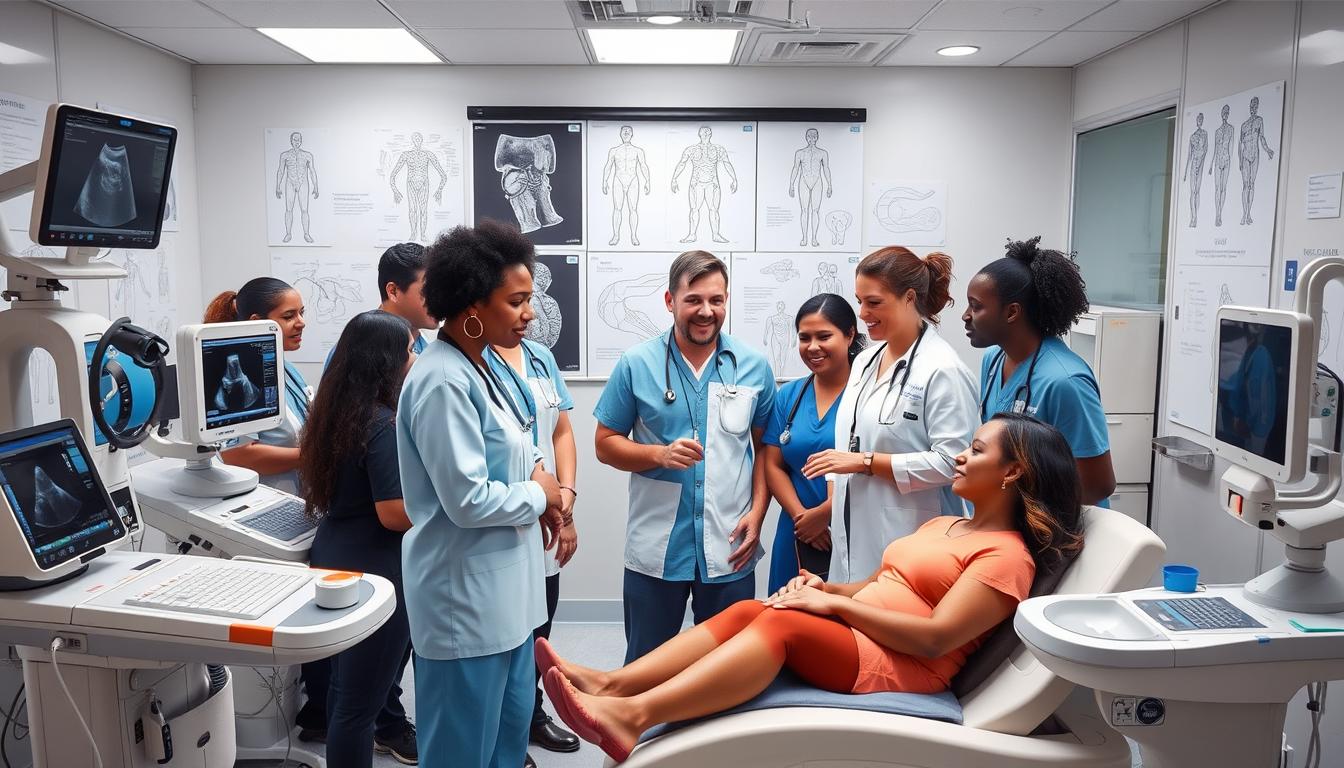Becoming an ultrasound technician or sonographer is an exciting career path. Understanding the education requirements is the first step to success.
This guide explores program types, curriculum details, and training duration factors. It will help you make informed decisions about your future.
A dynamic scene of a modern ultrasound training classroom featuring a diverse group of students attentively learning, with high-tech ultrasound machines in the foreground and an instructor demonstrating procedures on a large screen, filled with anatomical images and diagrams, a bright and well-lit environment, and an educational atmosphere.
Aspiring sonographers can choose from various educational pathways. These range from associate’s degrees to bachelor’s programs.
Program lengths vary based on different factors. Knowing your options is key to planning your career.
This guide offers essential information about ultrasound tech school. It will help you start your journey as a healthcare professional.
Understanding Ultrasound Technology Programs
Ultrasound uses sound waves to create images of body parts. It helps doctors diagnose and treat health issues.
Ultrasound techs run special equipment to get these images. They play a key role in healthcare.
To become a certified tech, you need proper training. Programs teach vital skills like attention to detail.
Good communication and tech skills are also important. These help techs capture and read images correctly.
Programs cover human body parts and how they work. Students learn to use different ultrasound tools.
They practice taking clear pictures of inside the body. Techs also learn to explain what they see to doctors.
Types of Ultrasound Tech Programs
Ultrasound technicians have several education options. These include associate degrees, bachelor’s degrees, and certificate programs.
Associate degree programs take about two years to finish. They teach medical imaging, anatomy, and patient care basics.
These programs are often found at community colleges. They’re popular for those wanting to start work soon.
Bachelor’s degree programs offer more in-depth education. They cover advanced imaging techniques and specialized clinical rotations.
These 4-year programs also focus on leadership skills. Graduates may have better jobs and earning chances.
Certificate programs are for healthcare professionals. They’re designed for nurses or radiologic technologists.
These programs usually last 12-18 months. They focus on specific ultrasound examination skills.
All programs include hands-on clinical training. Students must show skill in various ultrasound methods.
Program choice depends on career goals and prior education. It also depends on the desired expertise level.
Average Duration of Ultrasound Tech School
Ultrasound tech school length varies depending on the program you choose. Associate degree programs usually take two years, while bachelor’s degree programs often require four years.
Certificate programs in medical sonography are shorter, lasting one to two years. They are for people with healthcare backgrounds, such as nurses or radiologic technologists.
The length of the ultrasound program can change based on the school curriculum and requirements. Some schools offer evening or weekend classes for flexible schedules.
Your chosen sonography school duration depends on your goals and situation. Understanding program timeframes can help you choose the best path for your career.
Factors Influencing Program Length
Ultrasound tech school duration varies based on several factors. Program structure is key, with associate’s degrees taking 2 years and bachelor’s 4 years.
Full-time or part-time enrollment affects the timeline. Clinical training requirements also impact program length.
Most programs need 600 to 1,000 clinical hours. This can extend the overall program duration.
Program pace is another factor to consider. Traditional semester-based formats differ from accelerated, year-round schedules.
Students should research these variables carefully. This helps them choose the right program for their needs.
Accreditation and Its Impact on Duration
Accreditation is vital for ultrasound tech education. It ensures programs meet high standards set by recognized bodies.
Accredited programs offer top-notch training and clinical experiences. They prepare students for success in the sonography field.
Choosing an accredited program guarantees a better quality of education. These programs typically take 18 to 24 months to complete.
The longer duration allows for deeper learning. Students gain a thorough understanding of ultrasound technology theory and practice.
Graduates from accredited programs are well-prepared for certification exams. They have better chances of finding jobs in healthcare.
Many employers prefer candidates from accredited schools. They value the comprehensive education these programs provide.

Curriculum Overview for Ultrasound Tech
Ultrasound tech programs offer a wide-ranging curriculum. Students learn about human anatomy, medical terms, and sound wave physics.
The coursework covers how ultrasound technology works. It also teaches students to capture clear diagnostic images.
Patient care is a key part of the program. Students learn to talk with patients and keep them comfortable.
Hands-on training is crucial. It helps students develop skills in using ultrasound equipment.
Clinical rotations give real-world experience in healthcare settings. Students work in various medical fields like obstetrics and cardiology.
This well-rounded education prepares graduates for diverse healthcare roles. They gain the skills to excel as sonographers in many settings.
Understanding Clinical Rotations
Clinical rotations are vital for aspiring ultrasound technicians. They provide hands-on experience in real healthcare settings.
Students work with expert sonographers and radiologists during these rotations. They observe procedures and perform scans under supervision.
This exposure helps students improve their scanning techniques. They also learn to interpret images and develop patient care skills.
Clinical rotation length varies by program. Some require 8 weeks, while others may need up to 12 months.
These rotations are crucial for building skills and confidence. Students gain insights into the challenges faced by ultrasound technicians.
State Licensing and Certification Requirements
Ultrasound technicians need more than education to work. Most states require a license or certification to practice law.
The process varies by state. It usually involves passing a national exam and meeting specific requirements.
The primary certification is the Registered Diagnostic Medical Sonographer (RDMS) credential offered by the American Registry for Diagnostic Medical Sonography (ARDMS).
To get certified, sonographers must graduate from an accredited program and pass a comprehensive exam on various ultrasound modalities.
Some states have their own licensing rules. These may include state-specific exams or extra education hours.
Getting a license or certification takes extra time. It can add months to your ultrasound tech program.
Students should plan for exam prep and paperwork. This helps meet all qualifications for becoming a certified technician.
Job Outlook for Ultrasound Technicians
Ultrasound technicians have a bright future ahead. The field is growing fast, with a 14% increase expected by 2031.
This growth comes from the rising need for imaging services. Cardiovascular and obstetric care are key areas driving demand.
Sonographers are vital in healthcare. They use special tools to make images that help doctors diagnose illnesses.
As people age, the need for healthcare grows. This keeps the demand for skilled ultrasound techs high.
New technology, such as 3D and 4D imaging, expands what ultrasounds can do, creating more job options for techs.
A dynamic and vibrant scene of a diverse group of ultrasound technicians in a modern medical environment showcases advanced ultrasound machines, engages with patients, and is surrounded by anatomical diagrams and medical equipment, symbolizing growth and career advancement in healthcare. The scene has a bright and optimistic atmosphere.
In 2021, the median yearly wage was $77,740. Top earners made over $100,000, while lower earners got $54,000.
Pay can vary based on location and experience. Specializing in a field can also boost earnings.
The job outlook for ultrasound techs is strong. Good growth and may make it a great healthcare career choice.
Financial Considerations for Tech School
Becoming an ultrasound technician can be rewarding but costly. Tuition for ultrasound programs varies widely, ranging from $10,000 to $30,000.
Community colleges offer more affordable options, typically $10,000 to $20,000. Four-year universities or private schools can cost $30,000 or more.
Many financial aid options, such as scholarships, grants, and federal student loans, can help pay for ultrasound tech school.
Talk to the school’s financial aid office about funding opportunities. They can help you find ways to pay for your education.
Understanding costs and exploring funding options is key. This knowledge will help you make smart choices about your future career.
Tips for Choosing the Right Ultrasound Program
Picking the best ultrasound program is key for your career. Check if the program is accredited to ensure it meets industry standards.
Look at the program’s location and schedule. This helps you find one that fits your needs.
Compare different sonography programs. Find one that matches your goals and offers hands-on training.
Look for programs with experienced teachers and modern equipment. This ensures you get a well-rounded education.
The right program prepares you for the job market. It sets you up for success in healthcare imaging.
FAQ
How long does it take to complete an ultrasound tech program?
Ultrasound tech programs vary in length. Associate’s degrees take about two years, bachelor’s degrees 4 years, and certificates 1 year.
What type of ultrasound tech program should I choose?
Your choice depends on your background and goals. Associate’s degrees offer a solid foundation in medical sonography.
Bachelor’s degrees provide more in-depth training. Certificates are quick options for healthcare workers.
Do I need to complete clinical rotations for my ultrasound tech training?
Yes, clinical rotations are crucial for ultrasound tech education. These hands-on sessions last several months in healthcare settings.
What factors can affect the length of an ultrasound tech program?
Program length depends on enrollment status and clinical hours required. The format, traditional or accelerated, also affects duration.
Is it essential for my ultrasound tech program to be accredited?
Accreditation is vital for ultrasound tech programs. It ensures the curriculum meets industry standards.
Graduates from accredited schools can take certification exams and get licenses.
What career prospects are available for ultrasound technicians?
Ultrasound technicians have excellent job prospects. The field is growing faster than average.
They can work in hospitals, clinics, and diagnostic imaging centers.
How much does it cost to attend an ultrasound tech program?
Costs vary based on degree type and institution. Associate’s degrees range from $20,000 to $40,000.
Bachelor’s degrees can cost between $40,000 and $80,000.
You can also read more : How Long Does It Take to Become a Surgical Tech



